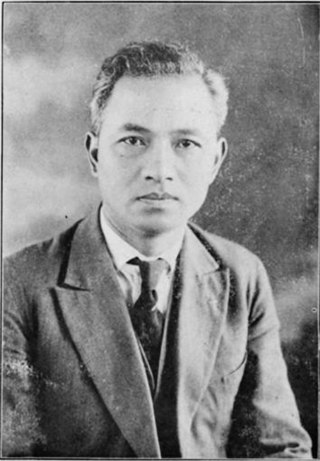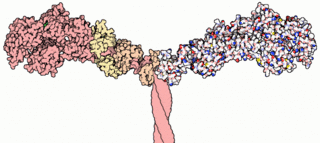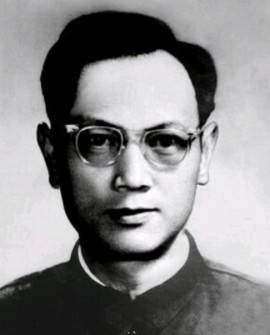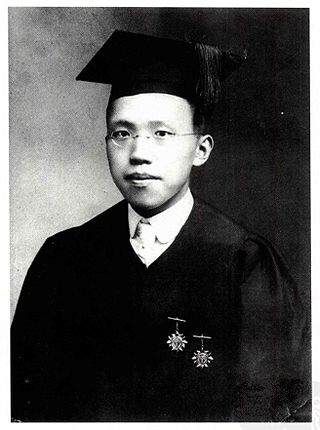
Li Siguang, also known as J. S. Lee, was a Chinese geologist and politician. He was the founder of China's geomechanics. He was an ethnic Mongol. He made outstanding contributions, which changed the situation of "oil deficiency" in the country, enabling the large-scale development of oil fields to raise the country to the ranks of the world's major oil producers.

Xie Xide, also known as Hsi-teh Hsieh and as Hilda Hsieh, was a Chinese physicist. She was president of Fudan University from 1983 to 1989, and remained as advisor to the university from 1989 until her death. She helped to set up the university's Centre for American Studies and founded its Modern Physics Institute in 1977.

Dorothy Mary Moyle Needham FRS was an English biochemist known for her work on the biochemistry of muscle. She was married to biochemist Joseph Needham.

A myosin light chain is a light chain of myosin. Myosin light chains were discovered by Chinese biochemist Cao Tianqin when he was a graduate student at the University of Cambridge in England.

Peng Jiamu was a Chinese biochemist and explorer.

Roger Sidney Goody is an English biochemist who served as director at the Max Planck Institute for Molecular Physiology in Dortmund from 1993 until 2013. Since 2013 he is Emeritus Director of the institute.
Zeng Rong is a Chinese biochemist researching and developing technology for proteomics research. She is currently a professor at the Institute of Biochemistry and Cell Biology at the Shanghai Institutes for Biological Sciences.

Zhang Xiaoqian, also known as Hsiao-ch'ien Chang, was a Chinese gastroenterologist who is considered the founder of gastroenterology in China. He served as President of Hsiang-Ya Medical College and Vice President of Peking Union Medical College, and was a founding member of both Academia Sinica and the Chinese Academy of Sciences.
In 1965, Chinese scientists first synthesized crystalline bovine insulin, which was the first functional crystalline protein being fully synthesized in the world. Research on synthesizing bovine insulin started on 1958. Members in the research group were from the Chemistry Department of Beijing University, Shanghai Institute of Biochemistry, CAS and Shanghai Institute of Organic Chemistry, CAS.
Li Zaiping was a Chinese molecular biologist considered a pioneer in genetic science and engineering in China. His research team was the first in China to sequence a virus genome. He also utilized E. coli to produce human EGF and GM-CSF, and identified the gene LPTS. He was a professor at the Shanghai Institute of Biochemistry and Cell Biology and an academician of the Chinese Academy of Engineering.

Zhang Youshang was a Chinese biochemist, professor and vice-president of the Shanghai Institute of Biochemistry and Cell Biology. He was a member of the Chinese Academy of Sciences and served as chief editor of the peer-reviewed journal Acta Biochimica et Biophysica Sinica (ABBS). His research was focused on protein structures and insulin.

Wang Yinglai, also known as Ying-Lai Wang, was a Chinese biochemist recognized as the first person to create synthetic insulin, a major scientific breakthrough that produced a biologically active compound from inorganic chemicals. He was one of the first group of scientists elected to the Chinese Academy of Sciences in 1955. He founded the Shanghai Institute of Biochemistry in 1958 and served as its director until his retirement in 1984.
Xu Genjun was a Chinese biochemist. He was a professor at the Shanghai Institute of Biochemistry and Cell Biology. He was an academician of the Chinese Academy of Sciences and President of the Chinese Society of Biochemistry and Molecular Biology.

Zou Chenglu, better known as Chen-Lu Tsou, was a Chinese biochemist. He was a professor of the Shanghai Institute of Biochemistry and later a professor and Deputy Director of the Institute of Biophysics, Chinese Academy of Sciences (CAS). He made important contributions to the synthesis of insulin, and was elected an academician of the CAS and The World Academy of Sciences (TWAS). He won the TWAS Prize in Biology in 1992 for his pioneering study of enzyme inhibition kinetics, and was a six-time laureate of the State Natural Science Award. His wife, physicist Li Lin, was also an academician of the CAS.

Li Lin was a Chinese physicist. She made important contributions to China's metallurgy, nuclear power, and high-temperature superconductivity programs, and was elected as an academician of the Chinese Academy of Sciences in 1980. Her father Li Siguang and husband Chen-Lu Tsou were also prominent scientists and academicians.
Li Lin is a Chinese biochemist and academician of the Chinese Academy of Sciences. He served as director of the Shanghai Institutes for Biological Sciences beginning in 2013, and was director of the Shanghai Institute of Biochemistry and Cell Biology (SIBCB) from 2004 to 2009. He was also a member of the 12th National People's Congress. His research focus is the Wnt signaling pathway.
Zhang Yonglian, also known as Yong-Lian Zhang, is a Chinese molecular biologist and endocrinologist. She is Professor and Founding Director of the Shanghai Key Laboratory for Molecular Andrology at the Shanghai Institute of Biochemistry and Cell Biology, and a member of the Chinese Academy of Sciences.
Zhang Zongsui was a Chinese physicist and an academician of the Chinese Academy of Sciences (CAS).

Yan Jici, also commonly known as Ny Tsi-ze, was a Chinese physicist and politician who is considered a founder of modern physics in China. He was a founding member of Academia Sinica in 1948 and of the Chinese Academy of Sciences (CAS) in 1955. He served as founding director of the CAS Institute of Physics and the second president of the University of Science and Technology of China (1980–1984).
Zhang Xu is a Chinese neuroscientist. He is an academician of the Chinese Academy of Sciences (CAS) and The World Academy of Sciences. He is a research professor at the CAS Institute of Neuroscience (ION) and serves as Vice President of the Shanghai Branch of the CAS.












